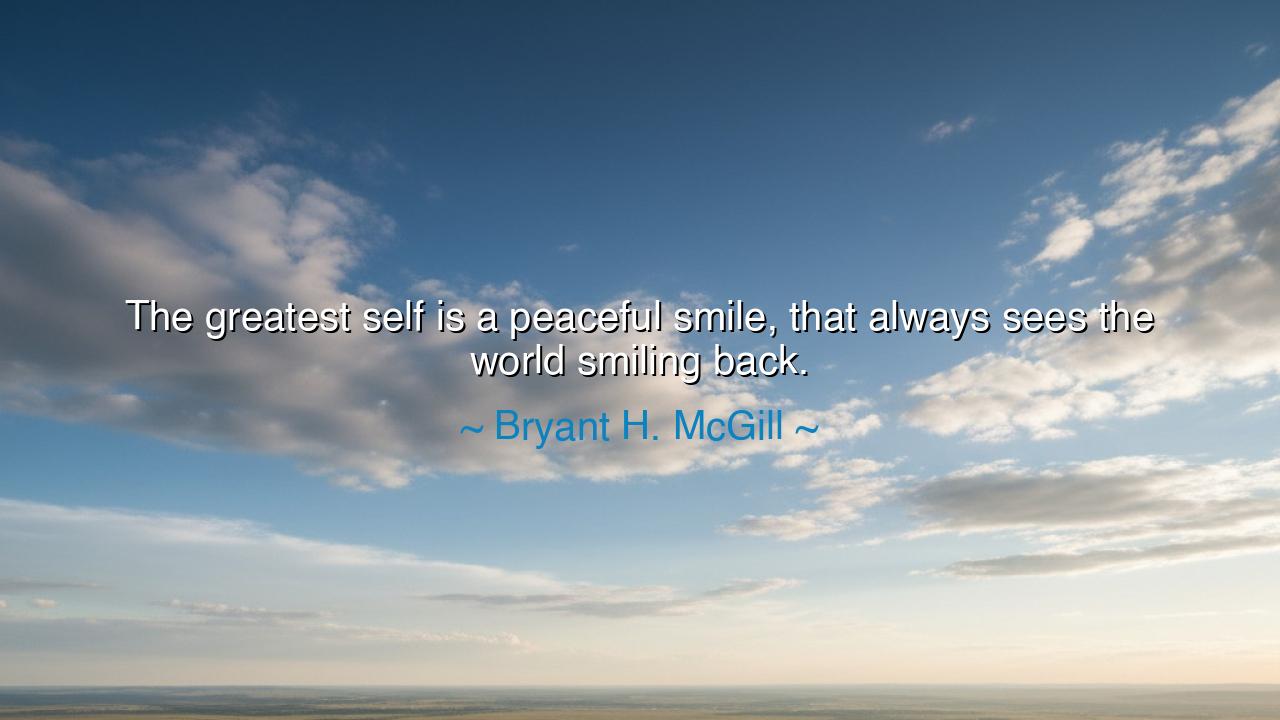
The greatest self is a peaceful smile, that always sees the world






Hear the words of Bryant H. McGill: “The greatest self is a peaceful smile, that always sees the world smiling back.” These words are not born of chance, but of deep reflection upon the nature of the human soul. They remind us that true greatness is not found in the conquest of others, nor in the hoarding of wealth, but in the mastery of the heart. The peaceful smile is not mere expression—it is the outward sign of an inner harmony, a stillness that cannot be shaken by storms. He who wears this smile carries within himself the kingdom of serenity, and through this serenity, he transforms the world around him.
The ancients taught that the world is a mirror of the soul. If one walks in anger, one sees only enemies; if one walks in fear, the earth is filled with shadows. But if one carries peace, the earth itself appears gentle. Thus McGill’s wisdom: the peaceful smile calls forth a reflection from the world, so that the one who smiles finds the world itself smiling back. This is no trick of chance, but the law of spirit—that the energy we radiate is returned unto us.
Consider the life of Mahatma Gandhi, who in the face of oppression chose not the sword, but the peaceful path. With a calm countenance and often a quiet smile, he faced down an empire. His power did not lie in armies, but in his ability to disarm hatred with peace. And the world answered him. Millions followed him, for they saw reflected in his peaceful smile the hope of their own liberation. His greatness was not the greatness of conquest, but the greatness of serenity—a living example of McGill’s teaching.
Yet let us not mistake the peaceful smile for naivety or denial of hardship. To smile peacefully is not to ignore suffering, but to stand firm in the face of it. It is the victory of the soul over bitterness. It is the warrior’s triumph without a blade, the sage’s wisdom without a word. Such a smile is not cheap—it is forged in the fires of endurance, in the struggles of forgiveness, in the discipline of choosing compassion when anger would be easier. It is a sign not of weakness, but of invincible strength.
The meaning of McGill’s words is also rooted in the ancient pursuit of balance. The Chinese sages spoke of yin and yang, of harmony between forces. The Greeks spoke of ataraxia, the calm of the soul. The Buddhists spoke of equanimity, the serenity that arises from detachment and compassion. Across the ages, wisdom has whispered the same truth: to be truly great is to be at peace, and to be at peace is to reflect peace into the world. The peaceful smile is the human face of this eternal harmony.
What lesson, then, shall the listener take? That greatness is not measured by how much power you wield, but by how much peace you embody. Seek not to dominate, but to cultivate within yourself the calm that nothing can disturb. Practice smiling in the face of adversity—not to deny its pain, but to declare that it will not rule you. Remember that the world is a mirror; if you give it a scowl, it will frown upon you, but if you offer it a peaceful smile, it will soften and return the gift.
So let your daily actions be shaped by this teaching. Begin each morning with a moment of stillness, breathing until your heart feels calm. When anger rises, pause, and choose compassion. When conflict arises, let your first weapon be gentleness. And when the world feels heavy, lift your face and smile—not the smile of pretense, but the smile of inner peace. With practice, this smile will become your nature, and your nature will become your strength.
Thus, O children of tomorrow, treasure this inheritance: “The greatest self is a peaceful smile, that always sees the world smiling back.” Let this wisdom be your compass. Be the one whose serenity steadies others, whose smile turns away wrath, whose peace transforms sorrow. For the one who carries peace within does not merely live in the world—the world itself is reborn through their presence.






AAdministratorAdministrator
Welcome, honored guests. Please leave a comment, we will respond soon